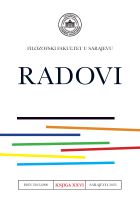DISKURS PROTIV RODNO OSJETLJIVOG JEZIKA
DISCOURSE AGAINST GENDER SENSITIVE LANGUAGE
Author(s): Sandra ZlotrgSubject(s): Gender Studies, Sociolinguistics, Descriptive linguistics, Sociology of Culture
Published by: Filozofski fakultet Univerziteta u Sarajevu
Keywords: discourse; critical discourse analysis; gender-sensitive language; gender equality; standard language; standardisation; language norm; language politics;
Summary/Abstract: This paper provides an overview of critical discourse analysis (CDA) methodology, focusing on the linguistic basis of the descriptive phase of Norman Fairclough’s CDA. This methodological tool is used to analyse the discourse against gender-sensitive language which is broadly defined as a collection of texts and speeches that propagate ideas contrary to the principles of gender-sensitive language and gender equality, i.e., texts and speeches that act against those ideas. In relation to discursive practices, the paper analyses to whom such texts are addressed and how they are disseminated, and in relation to socio-cultural practices, i.e., the social conditions under which such texts are produced, it analyses who actually has power and an underlying ideology. Because it is critical to examine power relations in an analysis, those in positions of power are used as examples of discourse, such as the Board for the Standardisation of the Serbian Language as a standardisation institution. Taking their decision on the adoption of the Law on Gender Equality in Serbia in 2021 as an illustrative example of the discourse, this paper tests the hypothesis that the Board for the Standardisation of the Serbian Language shapes the discourse against gender-sensitive language.
Journal: Radovi Filozofskog fakulteta u Sarajevu
- Issue Year: 26/2023
- Issue No: 1
- Page Range: 11-31
- Page Count: 21
- Language: Bosnian

